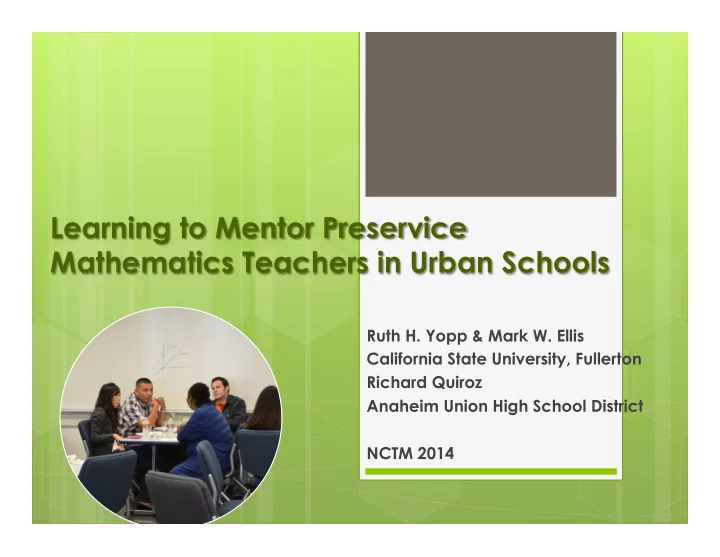

Learning to Mentor Preservice Mathematics Teachers in Urban Schools Ruth H. Yopp & Mark W. Ellis California State University, Fullerton Richard Quiroz Anaheim Union High School District NCTM 2014
Our Purposes Share our model for preparing experienced mathematics teachers to mentor pre-service teachers Describe development and use of self- assessment scales Discuss impact of training on teacher development and student learning
Agenda Welcome and introductions Our context Preparing our mentors Self-assessment tools Cases A mentor’s reflections and findings Concluding comments and questions
Our Context
$2.5 million Noyce project Funded by NSF Six years Recruit and prepare STEM majors to teach foundational-level mathematics in urban schools Prepare experienced mathematics teachers to serve as mentors and teacher leaders
African African Amer. Amer. 3% Other Other Asian/ 3% 2% 1% Pac. Isl. 8% White White 12% Asian/ 17% Pac. Isl. 16% Hispanic Hispanic 62% 76% AUHSD NLMUSD % Free/Reduced Lunch NLMUSD AUHSD 0 10 20 30 40 50 60 70 80 90 100
Preparing Our Mentors
Summer Institutes Reflections Defining the role of mentor Beginning skill building Monthly meetings Questions and answers Self assessments Group problem solving using mini cases
Successes& & & & Questions& What do I My partner say when and I have my student I waited teacher asks found the and he My co-teacher for a day recognized time to leaves right after off? & and solved a meet! school. I want problem her to stay so we & himself. can talk. What & should I do? & How do I get Second We have my students period was developed to recognize awesome great non- my student How do I not verbal teacher as a today! hurt my partner’s teacher? communication feelings when I skills. give her feedback on a lesson? &
Self Assessment Scales
Mini Cases Your teacher candidate never goes to the lounge with you. He eats in the classroom or goes home for lunch. You understand he is busy and may need the time to catch his breath, but you are beginning to wonder if he doesn't feel like a part of the campus community. Should you insist he join you in the lounge? Should you talk to him? What should you say? Does it really matter anyway if he doesn't hang with your colleagues in the lounge?
You and your teacher candidate have a positive relationship, despite a bit of a rocky start. You enjoy working with her and are proud she is developing into a fine teacher. She is creative, thoughtful, and focused in your co-planning meetings and follows through on what she says she will do. She seems to like the students, has effective classroom management skills, and teaches well. Unfortunately, you are starting to become a bit uncomfortable about some of her interactions with a few faculty at the site. You walked into the workroom one afternoon, for example, and found her laughing at unflattering comments a couple of your colleagues were making about some of the students. Another time she actually joined in the student bashing. Should this concern you? How much? Why might she be doing this? What should you do about it, if anything?
Your teacher candidate is a friendly, energetic, and positive person. You--and the students--are happy to have him in the classroom. Unfortunately, you are beginning to become concerned about his commitment to the students and the program. He has been late more than once and wasn't prepared for a co-teaching lesson you planned. Now he has asked you if he can "take a day off" to work on a course assignment. You like the guy, but really? What should you do? What kind of conversation might you have?
You planned a station teaching lesson and are in the middle of your instruction when you look across the room to see that your teacher candidate is not doing exactly what you wanted her to do with her group. Your students are working independently right now and you wonder what you should do. You consider-- *keeping your eyes open to see how her station progresses *leaving your station to position yourself near her station so you can subtly redirect her *leaving your station and interrupting her teaching to show the students a better way to solve the problem Which, if any, of these options should you select? What are other possible responses? What kind of conversation might you have?
Reflections
MT2 Program National Board Co-Teaching Collaboration
National Board Certification Better teacher (read literature, reflect) Better communicator (higher level of specificity)
Co Teaching Co-Teaching is defined as two teachers working together with groups of students and sharing the planning, organization, delivery and assessment of instruction and physical space.
More on Co-Teaching Parallel Teaching Model good classroom management skills. Ask good questions Implement ideas Work with different groups within the classroom
Collaboration Discuss mentoring and issues. Observe our mentors mentor us. Create scales. Demonstrate co-teaching model. Discussions on implementing co-teaching. Understanding we share certain challenges ---such as improving communication
Scales on Environment Trusting Supportive Welcoming Challenging Professional
More on Scales Ownership Reflection Quote “The scales, as written, helped me to ‘put myself in a box’ and ‘hold up a mirror’ so that I could be honest with myself regarding my professional relationship with my [student teacher] and my day-to-day interactions with her. The scales guided me in the direction of where I wanted to be and not want to be.” Carrie Balmages
Trusting and Supportive Environment 4 3.5 3 Mean Rating 2.5 2 Fall Spring 1.5 1
Challenging and Professional Environment 4 3.5 3 Mean Rating Fall 2.5 Spring 2 1.5 1 Challenging Professional
Concluding Comments
Learn More! Yopp, R. H., Ellis, M. W., Bonsangue, M. V., Duarte, T., & Meza, S. (in press). Piloting a co-teaching model for mathematics teacher preparation: Learning to teach together. Issues in Teacher Education , 23 (1), 91-111.
Recommend
More recommend